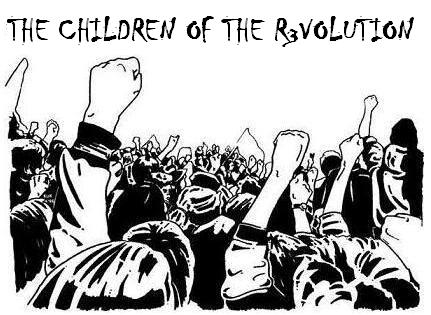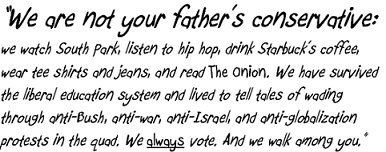 The first presidential debate was an exciting tie, but it could have and should have been McCain’s. While he performed better on the issues, McCain was inarticulate and unable to improvise. Obama, on the other hand, was graceful and quick on his feet, but showed some serious flaws in both his logic and his policy agenda. McCain could have snatched a clear and much-needed victory if only he’d had the wherewithal to pounce on them with biting criticisms. But he choked.
The first presidential debate was an exciting tie, but it could have and should have been McCain’s. While he performed better on the issues, McCain was inarticulate and unable to improvise. Obama, on the other hand, was graceful and quick on his feet, but showed some serious flaws in both his logic and his policy agenda. McCain could have snatched a clear and much-needed victory if only he’d had the wherewithal to pounce on them with biting criticisms. But he choked.The area where McCain was strongest was of course Iraq, but I was pleasantly surprised to see him outshine Obama when discussing flexibility in their spending agenda in the aftermath of the financial crisis. McCain’s strength, as seen in the Saddleback Forum, has always been clear, simple answers, whereas Obama has typically tried to sound nuanced and thoughtful but has come across as indecisive. In that vein, McCain managed to outmaneuver Obama by sounding eager to give Lehrer his answer: his spending agenda is so thin that the financial crisis will have little to no impact; in fact, he seeks to drastically cut federal spending as president, while his opponent’s plan calls for increases across the board. Obama, on the other hand, visibly stumbled. He was unwilling to identify which of his policy initiatives he would abandon even in the face of the financial calamity, managing nothing more than an acknowledgement that something would likely have to be cut.
Obama sought to turn the tables on McCain by attacking him directly on foreign policy (something that he had to do), attempting to frame the Iraq debate as a question of whether we should have invaded in the first place. McCain parried these attacks handily, but missed some serious opportunities to cut Obama down to size. I noted at least two items that lent themselves to a Reagan-esque retort. The first was Obama's criticism of the administration’s policy in Pakistan, saying we supported Musharraf despite the fact that he was a dictator because he was “our dictator.” Apart from this argument dismissing the fact that the United States pressed Musharraf relentlessly on democratic reforms (which resulted in the democratic Pakistan that exists today and Musharraf’s own resignation), he later seemed to contradict himself by blaming Iran’s ascendency on our toppling of Saddam, stating that Iraq was the only bulwark against Iranian influence. McCain should have jumped on this with gusto, asking Obama if he was suggesting a wiser policy would have been to keep Saddam in place to check Iranian influence, following up by remarking that Saddam was an undisputed dictator, and he wasn’t even our dictator. But the opportunity passed in what seemed to me like a frustrating silence. But another opportunity presented itself later in the debate, with Obama’s ill-advised and repeated statement that “no one was talking about defeat in Iraq,” which he employed as a defense against McCain’s criticism of his plan for troop withdrawal. McCain could have pulled off a zinger, and the one that immediately played over and over again in my head was, “You’re certainly being careful not to talk about defeat in Iraq, Senator Obama, but your policies speak for themselves, and quite loudly.” This could have been the sound-byte of the evening that the pundits were looking for. But again, McCain let it go by without a word of protest.
In order for him to have any hope of scoring polling points from the remaining two debates, McCain needs to work on his flexibility and improvisation. His attempts at humor were canned and lifeless, not to mention over-repeated (Miss Congeniality). But he remains more knowledgeable and comfortable on the issues and was very effective at showcasing his overwhelming experience. However, as these debates are 40% substance and 60% superficial, McCain must close that gap and get within striking distance of Obama.







2 comments:
I think you made some good points, but I have to say that both candidates left me sighing after the first debate. I agree with both your statement that McCain performed better on the issues and that Obama exhibited serious flaws in his policy agenda, but I'm not sure that most people will see it that way. Decided republicans and democrats will side with their candidate depsite the weakness of their arguement. Independents, however, need to understand what is being said and like to think they are making their own decision (emphasis on the THINK).
Were this two scholars arguing before a panel of academics, this would have been a crushing McCain victory. Unfortunately, the sophist is at his strongest when his audiance has trouble distinguishing fact from rhetoric, and Obama leveraged this difference between truth and perception very much to advantage Friday.
Ultimately though, I felt like I was watching live versions of the candidates commercials and stump speeches. I heard nothing new, and didn't get answers to any of the questions I personally hold. I definately walked away dissapointed in both men.
I have to agree- the lack of originality or definitive statements was not surprising from Obama, but McCain had opportunities, especially in the economic front, to give really meaningufl descriptions of his plans. Unfortunately, I think his head for numbers is not that great, or at least he had not prepared adequate notes.
In both candidates' defense, the current economic situation makes it such that nobody can meaningfully talk about future policy in definitive terms.
McCain actually won the debate, if only because Obama didn't.
I am curious to see how Palin manages to fare when her turn comes in a few days.
Post a Comment